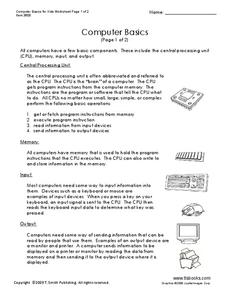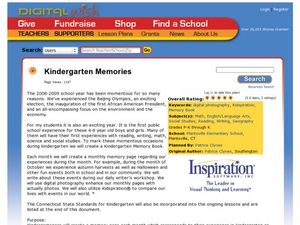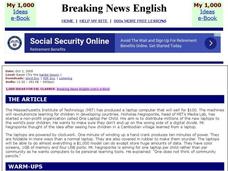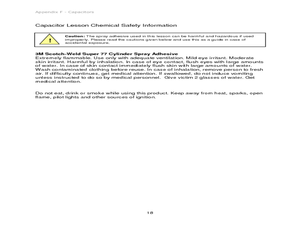Curated OER
What's Inside My Computer?
Pupils draw a picture of what they think a computer looks like inside. They learn the function of each part of a computer, the definitions of unfamiliar computer terms, and complete a worksheet of definitions of computer parts.
T. Smith Publishing
Computer Basics for Kids Worksheet
This informational reading worksheet can be used in your literacy or computer class. Learners learn the basic components of computers then test their knowledge with multiple choice and fill-in-the-blank questions.
Code.org
Controlling Memory with Variables
Not all variables are created equal. Discover how variables in computer science are different from variables in math class. Scholars learn to work with variables in computer programming by developing a mental model for how variables...
Curated OER
Computer Storage Worksheet
In this math worksheet, students are given examples of different memory capabilities for the types of storage devices. They match the memory to the device for fifteen problems.
Curated OER
Class Memory Book
Class members use digital cameras, computers, laser printers, and booklet making supplies to create their own page for a class memory book.
Curated OER
Memory in Your World
Students identify similarities and differences between machines with memory and machines without memory. They illustrate how a machine with memory might fit into the student's world.
Curated OER
Kindergarten Memories
Young scholars create a monthly memory and compile it into a Kindergarten Memory Book. In this memory book lesson plan, students create a monthly memory page. Young scholars create a graphic organizer in Kidspiration which is developed...
Curated OER
Computer Basics For Kids Worksheet
The computer can be a wonderful tool with so many applications. Third graders read a four paragraph procedural text to learn about: central processing unit, memory, input, output. They answer four fill in the blank and multiple choice...
Curated OER
Computer Words
Here is a set of cards explaining the meanings of a variety of different parts of a computer. While not exactly a lesson per se, these cards could be printed out and used quite easily in a formatted lesson. In this time of computers,...
Curated OER
Our Computers, Ourselves: Imagining the Digital Lives of Authors and Characters
The guiding question for this lesson is "Do computers and their contents shape who we are?" Open with a selection of Apple's commercials to introduce stereotypes and people's relationships with their computers. Then, read the attached...
Curated OER
Introduction to Computers
Fifth graders listen as the material on Computer Components and Assembly Script is described. They then get in groups of 4 or 5 and stand together in a line with each student respectively representing one memory register. Another child...
Curated OER
Computer Parts Quiz
In this technology instructional activity, students find the words that are associated with the use of a computer and the answers are found at the bottom of the page.
Curated OER
Breaking News English: One Hundred Dollar Laptop Computer
In this one hundred dollar laptop computer worksheet, students read the article, answer true and false questions, complete synonym matching, complete phrase matching, complete a gap fill, answer short answer questions, answer discussion...
Curated OER
Memory in Your World
Students rotate through three classroom stations and identify similarities and differences between machines with and without memory, such as typewriters and computers, and illustrate how machines with memory fit into their world.
Curated OER
Human Computer Game
Students view the "Parts of a Computer" Power Point presentation then they view the inside of a computer and break down each operating system and its job. They compare and contrast the difference between human and computer parts that...
Curated OER
Computer Applications - 4
Pupils review their understanding of basic computer terminology. They demonstrate an understanding of the function of each major computer component. They identify some characteristics of the Windows operating system.
Curated OER
What's Wrong With This Computer?
Young scholars, while in the computer lab, view a PowerPoint Presentation that addresses routine hardware and software problems that may occur with everyday usage of a computer. They identify and solve routine problems by checking...
Curated OER
Before Computers
In this before computers worksheet, students fill in the blanks to sentences about what computer terms used to mean. Students complete 7 multiple choice questions.
Curated OER
Working With Start Up Options
In this technology worksheet, pupils practice the process of starting up the network and individual computers while using the skill of troubleshooting.
Curated OER
A Stroll Down Memory Lane
Students examine the functionality of different types of computer memory (RAM) as a springboard to researching the definitions, uses and functions of different common computer terms. The class creates a computer terminology guide.
College Board
Using the Java Collections Hierarchy
Collect a set of collections. Professional development material provides teachers with information about collections that are in AP Computer Science. Materials include teaching strategies, sample labs, and worksheets. Educators use the...
Curated OER
Capacitors: What Are They?
Students discover how capacitors help store data. In this computer science activity, students investigate how capacitors can store an electronic charge, eventually helping computers store data. Students create their own capacitors with...
Curated OER
ESL Vocabulary-Computers and Technology
In this ESL computer and technology vocabulary worksheet, students choose the correct name for pictures of technology related items, fill in blanks in sentences, watch a video and "discuss with friends."
Curated OER
The Fresh Prince of Bel Air Gets Connected
Students view video clips from the TV show, "The Fresh Prince of Bel Air" to show their different uses of computers. They review the steps involved in designing and planning a networked office or home and analyze the needs of the users...

























